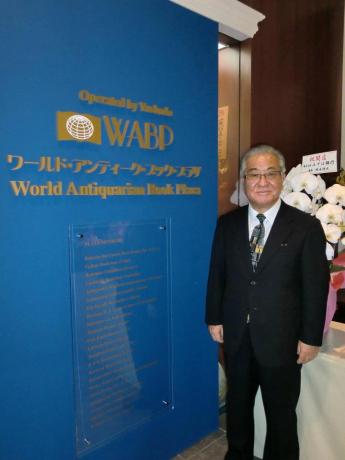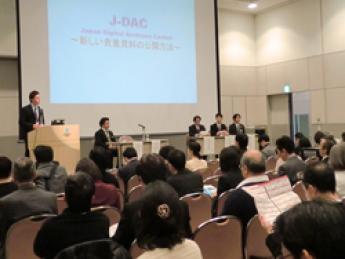Antiquarian Booksellers' Association of Japan Maruzen-Yushodo Co., Ltd.
Yushodo - A Case for a Decisive Transition from the Past to Future

By Mitsuo Nitta
We are living in a world that is in constant flux, rendering any future predictions practically unreliable. This fact should not, however, discourage us from setting out clear goals for the future. Indeed, concepts such as “intent”, “mission”, and “commitment” become all the more important in such a world. In this post, I would like to share with readers, especially those involved in the book business and the library sectors overseas, what Yushodo hopes to achieve in the future and how we intend to achieve them.
The Japanese Market
One harsh reality for booksellers in Japan is that the total sales of books is declining every year. The decline itself would not be of much concern if we were seeing an increase in the sales of eBooks. But unfortunately this is not the case. If we define books as a means by which one acquires information, Google already has the upper hand over all of us. Would “real” printed books survive this rapid development of information technologies? If so, what would the eBooks-to-printed books ratio look like in the future? My own guess is that 80 percent of all books published in the future will remain “real” printed books. To support this claim, there seems to be a surge in the number of publishers who are committed to publishing quality books. Ever since the invention of the printing technology more than 500 years ago, we have been creating and re-creating culture. With the principles set out in the Printing and the Mind of Man as our core values, Yushodo maintains its commitment to publishing quality books by cooperating with numerous publishers around the world. Last year I was pleasantly surprised when I found a copy of our book published almost 40 years ago, written on the subject of Japanese paper (washi), on the shelves of a library in the Netherlands as well as the National Central Library in Taipei. We will remain committed to producing quality books, and hope that we will have the opportunity in the near future to collaborate with publishers overseas in the production of books that libraries around the world would want to include into their collections.
99 percent of all books sold in Japan are written in Japanese, and of that 99 percent, only a little over 6 percent are books sold to libraries. Thus, most publishers never had to, and never will, bother too much with the library market. But on the other hand, it is also true that there are many book sellers who rely on the existence of the library market, including Yushodo who employs more than 100 people, since the library market plays a significant role in the sales of high-priced books. As for western books, 70 percent of all transactions occurring in Japan concern the library budget of one research institution (usually university institutions) or another, and for this reason, the experience and knowledge of a sales representative who visits libraries and individual researchers on a daily basis are indispensable for the sales of such books. On the other hand, we must also make an effort to remain competitive among new generation book stores such as Amazon. From my experience, in Japan introducing and getting information across to the customer through the Internet or printed catalogues does not guarantee success. This trait unique to the Japanese market is what contributed to its remarkable growth, making it a desirable market not just to publishers in Japan but also to those overseas.
In the current state of world affairs and the rapid development of information technologies, however, it is becoming increasingly obvious that Yushodo’s traditional business model is no longer able to effectively capture the realities of today’s market. We clearly recognize the need for a fundamental re-analysis of the Japanese market and a renewed marketing strategy. I am of the opinion that there are too many booksellers in Japan dealing in western books relative to the size of the market. Excessive competition among publishers does not enhance customer experience. For this reason, we regard collaboration with publishers overseas as an essential part of our mission.
China and Other Markets in Asia
I have been asked more than once by people in the publishing and book industries about the Chinese market, whether it will evolve into what the Japanese market looked like 30 years ago. China is currently trying to collect and reclaim cultural assets that were lost and scattered all over the world in the past 100 years. This partly explains why prices for Chinese antiquarian books are rising. This is also why I suspect that there would not be much demand for western antiquarian books in the Chinese market at the present moment. Rather, I am shifting my attention to the ASEAN countries as potential target markets for western books (or more accurately books written in English), the reason being, among many, that the English level in these countries are relatively higher than that of East Asia, and accordingly, so is demand for books written in English. The fact that this year’s IFLA Annual Conference is being held in Singapore, I believe, provides sufficient justification for this shift of attention to the Southeast Asian region.
The Library Fair and Forum, 15 years and counting…
First organized almost 15 years ago, the Library Fair and Forum has been the destination for librarians and professionals affiliated with the library sector in Japan, providing a space for those who work for and care about the library to freely discuss issues and exchange opinions. Last year, we had more than 27,000 visitors and 130 exhibitors with 95 talk sessions, seminars, and symposiums, cementing its status as the new epicenter for the library sector in Japan. We will be celebrating the 15th anniversary of the Library Fair and Forum this October. We invite and encourage everyone to share in this rare opportunity to connect with the library community in Japan and help us lead the library sector into an exciting future full of international cooperation and inspiring innovation.
Last word
The Japanese market has long been protected by the language barrier, but we at Yushodo think it is time to take a decisive step forward, out into the global market, both in terms of sales and production. The year 2013 marks the 80th anniversary for Yushodo. What would the world look like in 2033, when we celebrate our centennial anniversary? No one can be absolutely sure, but I am confident that, no matter how evolved information technologies become, there is always going to be room for “real” printed books, and that these books will never cease to be an invaluable part of our culture.
The article is published on the Yushodo website. It is presented here by permission of Mr. Mitsuo Nitta. Thank you very much.


